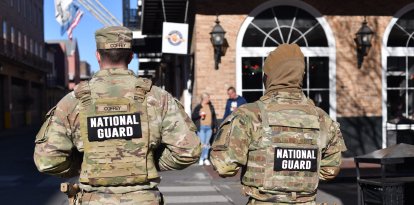New York: Gov. Kathy Hochul decides the future of assisted suicide
Supporters and opponents of the bill are appealing to the Democratic governor to turn in its favor. If she decides to approve it, her state will join 11 others with similar legislation.

Demonstration against euthanasia.
Assisted suicide lacks only the signature of Governor Kathy Hochul to become law in New York. The Democrat, for the moment, has not clarified whether or not she will sign.
The Medical Aid in Dying (MAID) Act received approval from the blue-majority state Senate. Six Democrats joined Republicans in voting against it, just as 21 had done in the state Assembly in April. Some of the latter expressed concern that patients could be coerced into suicide, especially if they are low-income.
"MAID is a proven strategy to expand end-of-life options and reduce human suffering for patients with a terminal illness," state Sen. Brad Hoylman-Sigal, the rule's sponsor, said after the latest vote. He also had a message to Hochul: "I am looking forward to the governor signing this bill into law so." That was three days ago.
Those who promote the bill point out that it includes only terminally ill adults, whose life expectancy does not exceed six weeks. They also point out that it requires the endorsement of two doctors, who will rule whether the patient is mentally capable of deciding about his or her own life.
Its critics, however, point out, among other reproaches, that the legislation lacks a mandatory "reflection" time between the request and the delivery of the lethal drug. Others, such as activist group Not Dead Yet, warn that it will particularly affect people with disabilities:
"What Governor Hochul does ... will speak volumes about how in-tune she is with the progressive international disability rights movement," wrote the group's interim executive director, Ian McIntosh. "And more importantly, with New Yorkers who reject the idea that suicide is rational, just because a person has a disability."
Bishops in the state had a similar message: "Sadly, we are facing a suicide crisis among young people in our state, and the government rightly spends large sums of money to prevent these tragedies and to deliver a consistent message that life is worth living. Now our state will be telling its citizens that some lives – perhaps where there has been a loss of autonomy or a disability – are not worth living."
"We call on Governor Hochul to exercise her veto authority should the bill come to her desk," the bishops concluded.
Nationally, U.S. Rep. Elise Stefanik (R-N.Y.) rallied against the rule, asserting that it was "a shameful attack on the sanctity of life" and a "betrayal" of the most vulnerable citizens. "New Yorkers deserve better than Far Left policies that erode our moral foundation and push families toward heartbreak."
Assisted suicide in the United States
If Hochul signs the bill, New York will become the 12th state in the country to approve some form of assisted suicide. The list is also joined by Washington, D.C., according to a Compassion&Choices, a national group that supported the Hoylman-Sigal bill.
Vermont and Oregon, moreover, allow it for nonresidents. Vermont Department of Health data collected by CBS News show that 26 people who died with public resources between May and June 2023 were from out of state. That's 25% of the total. In Oregon, the number was 23, just over 6% of the total, according to officials.
There are activist groups that even offer checklists of recommendations to keep in mind before embarking on the deadly route to Vermont, Oregon or other countries. There are also associations, such as Death With Dignity, that provide recommendations ranging from "create a will and an estate plan" to planning funeral details: who do you want to speak, should there be music, etc.?
Death With Dignity even has model laws for state legislators to draft their own proposals. Hoylman-Sigal specifically appreciated DWD's work.
Globally, 30,000 people died annually from assisted suicide and euthanasia, according to a study by British media outlet The Telegraph.
Euthanasia, assisted suicide or assisted death?
While all describe a death authorized and executed by a state, in "assisted suicide," the patient himself consumes a lethal dose provided by a physician, whereas in "euthanasia," the professional delivers the drug, for example by injection.
Euthanasia, however, is also often used as an umbrella term for both cases.
The term "assisted suicide" is often rejected by politicians and pro-euthanasia activists, who prefer "assisted death."




























